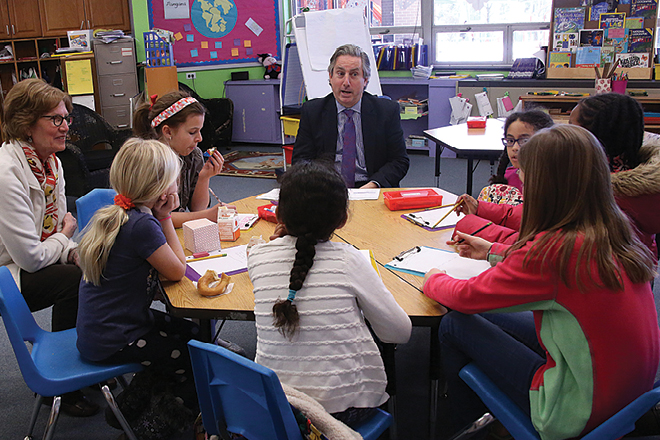Interview by Cecily Garber
Photo above: Aloise speaks with a third-grade class at Springside Chestnut Hill about water usage.
Net Assets: You began your career as a derivatives trader, working in Chicago, Philadelphia, New York and abroad — in Basel, Frankfurt and Zurich. How did that experience impact your work as a business officer?
Frank Aloise: There’s a direct connection between my investment banking experience and schools. As CFO, I now work with the endowment. I help set up employees’ 403(b) plans, for example. But more importantly, trading was a strange, difficult business. I had to deal with a lot of information and process things very quickly, and often that’s what happens at a school. You wear many hats and have to know a lot about what’s happening around you. In the trading world, you had to be quick on your feet and know how one event would impact the market. While schools are not as fast paced, you need to know about all aspects of the institution — everything from regulations to retirement planning to healthcare to education to pay scales to buildings and bond issues. It’s such a wide range of things we’re involved in.
Having moved around the country and Europe taught me how to work with a lot of different people in different environments, which benefits me in the school business office role because things are constantly changing and evolving. You need to interact with a lot of different people on a daily basis.

Net Assets: How did you find your way into the independent school world?
Aloise: It’s quite surprising that I ended up in this profession. I never knew about it, much less planned for it. When I was a senior in college, a dean I was close to wanted me to stay on and work for him; he wanted to make me an assistant dean. I took another opportunity to work at a private partnership, but I retained that relationship. When I decided I no longer wanted to work in investment banking, this former dean had become the head of a private school, and once again, he said, “You should work for me.” A relationship I had developed 10 years earlier led to a job I never would have imagined. That mentor is someone I still know to this day, 34 years after having met him.
At the end of the day, everything in life is about relationships. If I had to give one piece of advice, I’d say make sure you are open to hearing from other people.
At the end of the day, everything in life is about relationships. If I had to give one piece of advice, I’d say make sure you are open to hearing from other people and maintaining good relationships because you never know who you’re going to work with and who you’ll learn from in the future.
Net Assets: What do you think are the two or three most pressing issues for the profession today?
Aloise: First, we as educators need to make sure that we remain relevant and forward thinking. We must closely watch for what is needed in the future and not rely on what we have done in the past. In a rapidly changing, shrinking world and a global economy, it’s more important than ever that we’re careful in how we prepare students for the future.
Second, independent schools operate in a very competitive marketplace and very specialized service industry, so we must make sure that we’re managing our resources and funds very carefully. This is an extremely expensive model of education; delivering a highly personalized experience to students costs a lot of money. It’s important to ask, how can we provide that experience to as many children as possible? Delivering on our mission costs more every year because we are a service industry and our costs are driven by people. There’s very little efficiency in the business, so we must be very thoughtful in preventing tuition from escalating out of control.

Net Assets: Your friends say that you love technology. How did that begin?
Aloise: I was lent a computer when I was 12 years old. It was one of the first computers out there on the public market, in the late 70s. It was a TRS-80 from Radio Shack. A teacher handed it to me and said I should learn how to use it over spring break.
I had no idea what to do, but I learned. There were no CD ROMS or floppy discs then; you wrote code on cassette tapes. We were mostly playing games. There were no video games. Instead, we created our own games using the BASIC programming language. At 12 years old to be trusted by a teacher with a pretty expensive computer was something. It opened up my mind and my willingness to take risks and try things.
Net Assets: Where do you find inspiration?
Aloise: I learn so much from participating in other organizations and board meetings; these roles have been a gigantic benefit to me. Other board volunteers have unique perspectives and are available to answer my questions. They’ve helped me grow and become a better leader and person. Serving is selfish in a way; I don’t do it for that reason, but the benefit has been great.
Something else that’s inspired me recently is design. I heard the author and design aficionado Daniel Pink speak at NBOA’s Annual Meeting a few years ago. Reading in this other field is one way to see things from a different perspective, from outside the sphere we work in. You can consider how a sign is laid out and how a building is laid out, and how a simple, elegant form can translate into good function in everyday life.
Now I follow a few design and architecture blogs, and one of them mentioned the entrepreneur Derek Sivers, who founded CD Baby in the 90s. He wrote a book, “Anything You Want,” about 40 lessons he learned from that business. When he fumbled and made mistakes, he admitted them. The book has useful leadership lessons about how you should do what you love, keep your mission and principles in mind, and stick to them.

Net Assets: How has the role of the business officer changed over the years?
Aloise: I’ve been in this role for 20 years, and it’s changed a lot from when I first started. The role was beginning to change back then, from an old-fashioned, back-room accounting job to a position of partner and participant in the leadership of the school. I’ve been able to work with great colleagues both in and outside of schools who have helped improve the educational mission of the institution. Today, unlike in the past, business officers must understand what is needed to educate children for the future and help envision that with colleagues.
Frank Aloise is the chief financial officer at Springside Chestnut Hill Academy. He has served at Springside since 2000 and oversaw its merger with Chestnut Hill Academy in 2011. Aloise has chaired the boards of the Philadelphia Area Independent School Business Officers Association and NBOA as well as TIAA-CREF’s Direct Advisory Council. He currently serves as president of the Hobart and William Smith Colleges alumni association, his alma mater. Read more about NBOA awards and recipients on NBOA.org.
Download a PDF of the article.





